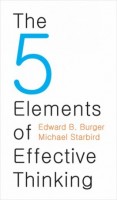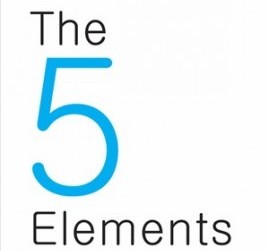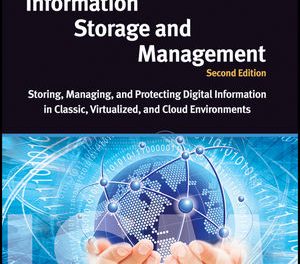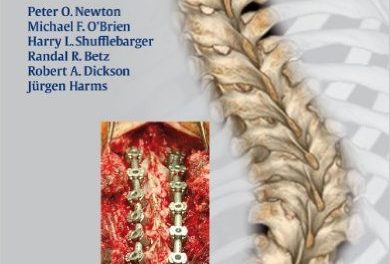 Authors: Edward B. Burger and Michael Starbird
Authors: Edward B. Burger and Michael Starbird
Publisher: Princeton University Press
Book Review by: Paiso Jamakar
In this compact, handy book of 157 pages with five chapters by educational consultants Edward B. Burger and Michael Starbird, you get a quick overview of what makes for effective thinking.
The five “elements” are: earth, fire, sir, water, and the “quintessential element,” which we will describe to you below.
Cleverly, the authors have related titles of the chapters to the elements: the first chapter for example – Grounding Your Thinking – alludes to the earth.
Chapter 1: Earth – Grounding Your Thinking
In this chapter, the two professors urge you to “understand deeply,” or in other words dig deeper into the ground, in order to get to the roots of the subject matter in question.
In five topics within this first chapter, you are shown “how to understand simple things deeply” in short order; get to the bottom of anything or “seek the essential” by clearing your mind of clutter that surrounds your thinking of the subject; look at the available and the missing aspects of it; and a suggestion that thinking deeper is better.
Chapter 2: Fire – Igniting Insights through Mistakes
You may have heard the advice “fail to succeed.” Essentially successful individuals have related to others, the several or many failures they went through before attaining success. In most cases, there is no shortcut to success.
The topics covered in this second chapter relate to welcoming (yes, welcoming) mistakes because they are a good teacher on how to do things the right way; “finding the right question to the wrong answer (yes, not the other way around); a sort of plan to fail, described by the authors as “failing by intent” (again welcoming failures?); and how to develop a “modified mind-set.”
Chapter 3: Air – Creating Questions out of Thin Air
Here, Burger and Starbird urge you to “be your own Socrates” or do the inquiries yourself into any important matter you are keenly interested in. What happens then is that when you find answers to the questions you ask, you find yourself asking even more questions which makes you a better thinker in turn; you “create questions that enliven your inquiry” even more; and a description of “the art of creating questions and active listening.”
Chapter 4: Water – Seeing the Flow of Ideas
Just as you view a flowing river, the authors ask you to “look back, look forward” in this chapter. The three topics here have all to do with the evolution of ideas. For example, first there were propellers on airplanes before jet engines came along. You are shown here how to gain an understanding of ideas by examining their “flow” over time; thinking through old or current ideas to create new ones; and why your thinking should always be “on” or why your thoughts should always be “under construction.”
Chapter 5: The Quintessential Element – Engaging Change
What is the quintessential element? In the quest to improve the way we think and learn things, we need to embrace change, especially the specific suggestions offered to us in this book. So the fifth important element is change itself, point out the authors.
In this last chapter, you are urged and shown how to no less than “transform yourself.” To me, experience is the best teacher. The authors point out to their own experiences with various people and make a very important point, which I believe to be the central message of this book:
“Through our experience with hundreds of thousands of students, teachers, professionals, business leaders, and lifelong learners, we know that if you follow the lessons in this book, you will learn and understand at a deeper level; you will think of creative ideas; and you will be successful throughout life. The quintessential element is really about the “if you follow the lessons” part of the previous sentence.”
This is a short book, easy to read and understand. But its value is very high because it teaches us how to change the way we think. It shows us how to think effectively. Our thoughts precede our actions and govern our lives. The way we think determines our success and happiness in life. If these are important elements to you, so is this book.







